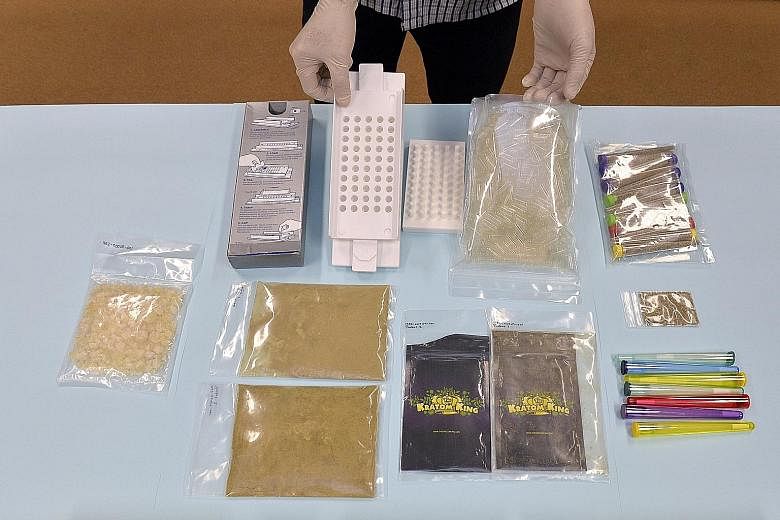A rapidly growing number of new drugs, with snazzy street names such as K2, Meow Meow and Spice, have been outlawed here.
These new psychoactive substances (NPS) mimic the effects of older, popular drugs such as marijuana, cocaine and Ecstasy.
They are also designed to avoid easy detection. As a result, a growing number of young drug users are turning to them to avoid getting caught, drug counsellors say.
From May 1, five NPS, including one known as Pink, were added to the Class A controlled drug list.
There are now 81 individually named NPS and 11 generic groups in the Class A list, the Central Narcotics Bureau (CNB) told The Straits Times.
In the last three years, between 10 and 22 individually named NPS were added to the Class A list each year. Trafficking, manufacturing, importing, exporting, possessing or consuming a Class A drug is a crime. The minimum punishment for trafficking in Class A drugs is five years' jail and five strokes of the cane.
CNB communications director Sng Chern Hong said the "threat" of NPS was first noted here in 2009. The following year, the CNB first listed three NPS as Class A drugs.
In 2013, it amended the Misuse of Drugs Act to adopt the generic listing approach to tackle the NPS scourge.
Generic group listing allows the CNB to control a group of substances sharing the same core compound or molecular structure so that even if minor substitutions are done to this core compound, the resulting NPS will still be classified as a controlled drug that the CNB can take action against.
Mr Sng said: "Compared with individual listing, this is a more effective way to combat rogue chemists who attempt to evade the law with different permutations derived from manipulating the core compound."
In the past two years, the CNB has seized more than 3.5kg and 4,000 tablets of NPS here. But only nine people have been arrested for abusing NPS between 2014 and last year - which belies the gravity of the problem and the growing number of abusers, drug counsellors point out.
Mr Sng acknowledged that drug syndicates are "increasingly sophisticated" at designing drugs to avoid detection.
The number of NPS identified has shot up from 126 in 2009 to at least 730 last year, according to a World Health Organisation Expert Committee on Drug Dependence report, making detection even harder.
The CNB says it works closely with its foreign counterparts to share information on the latest trends. It also works with the Health Sciences Authority to detect such substances.
In January last year, the CNB also started its Anti-Drug Counselling and Engagement programme for those under 21 who have confessed to using drugs but whose urine tested negative for drugs. This could be because they took them some time before the urine test was carried out, Mr Sng said.
So far, 10 young people have completed the programme and four are still on it. They are counselled to help them deal with addiction and parents are taught how to support their children to kick the habit.
Mr Don Wong, executive director of New Charis Mission, which runs a halfway house, said: "The new psychoactive substances are like a fire. The worry is how fast they spread (among drug abusers)."


